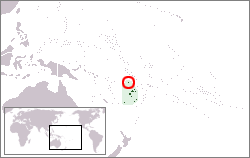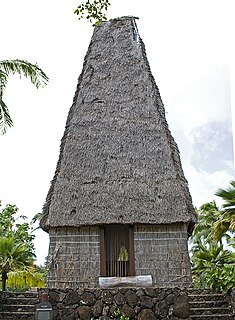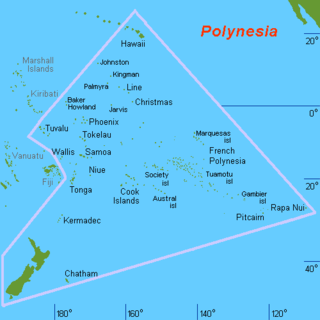
Fiji, officially the Republic of Fiji, is an island country in Melanesia, part of Oceania in the South Pacific Ocean. It lies about 1,100 nautical miles northeast of New Zealand. Fiji consists of an archipelago of more than 330 islands—of which about 110 are permanently inhabited—and more than 500 islets, amounting to a total land area of about 18,300 square kilometres (7,100 sq mi). The most outlying island group is Ono-i-Lau. About 87% of the total population of 883,483 live on the two major islands, Viti Levu and Vanua Levu. About three-quarters of Fijians live on Viti Levu's coasts: either in the capital city of Suva; or in smaller urban centres such as Nadi—where tourism is the major local industry; or in Lautoka, where the sugar-cane industry is dominant. The interior of Viti Levu is sparsely inhabited because of its terrain.

Melanesia is a subregion of Oceania in the southwestern Pacific Ocean. It extends from New Guinea in the west to Tonga in the east, and includes the Arafura Sea and a few thousand islands.
Fijian mythology refers to the set of beliefs practiced by the indigenous people of the island of Fiji. Its gods include Degei, a serpent who is the supreme god of Fiji. He is the creator of the (Fijian) world. He judges newly dead souls after they pass through one of two caves: Cibaciba or Drakulu. A few he sends to paradise Burotu. Most others are thrown into a lake, where they will eventually sink to the bottom (Murimuria) to be appropriately rewarded or punished.
In the mythology of Fiji, Samulayo is a god or spirit of war and those dead souls who died in battle.

In Cook Islands mythology, Avatea was a lunar deity and the father of gods and men in Mangaian myth of origin. His eyes were thought to be the Sun and the Moon; he was also known as the god of light.
Pulotu is the resting place of those passed on in the Polynesian narrative of Tonga and Samoa, the world of darkness "lalo fonua".

In Hawaiian mythology, Laka is the name of two different popular heroes from Polynesian mythology.. Lengthy legends of their exploits extend throughout the islands, and the kings of Tahiti and Hawaiʻi claimed them as their ancestors.

In Fijian mythology, Dakuwaqa (Dakuwanga) is a shark-god. He was greatly respected by fishermen because he protected them from any danger at sea and sometimes protected them from evil denizens of the sea.

Rotuma is a Fijian dependency, consisting of Rotuma Island and nearby islets. The island group is home to a large and unique indigenous ethnic group which constitutes a recognisable minority within the population of Fiji, known as "Rotumans". Its population at the 2017 census was 1,594, although many more Rotumans live on mainland Fijian islands, totaling 10,000.
Fijians are a nation and ethnic group native to Fiji, who speak Fijian and share a common history and culture.
The Lau Islands of Fiji are situated in the southern Pacific Ocean, just east of the Koro Sea. Of this chain of about sixty islands and islets, about thirty are inhabited. The Lau Group covers a land area of 188 square miles, and had a population of 10,683 at the most recent census in 2007. While most of the northern Lau Group are high islands of volcanic origin, those of the south are mostly carbonate low islands.
Fitiuta, also known as Fiti'uta or Maia, is a village on the northeast coast of Ta‘ū island, one of the Manu‘a Islands in American Samoa. According to the US Census of 2000, Fitiuta had a population of 358, down from 454 in 1990. As of the 2010 United States Census, it had a population of 153. The village of Fitiuta is made up of two hamlets: Maia and Leusoali'i, the latter of which is the most eastern area on the island. Historically, they were classified as villages. The town has two shops, a hotel and a church, which was recently built. Fitiuta Airport is located in the town.
The history of the Jews in Fiji is intertwined with the settlement of the Fiji islands by European explorers and settlers. Most of these settlers arrive in Fiji via Australia and New Zealand.

Religiously, Fiji is a mixed society with most people being Christian, with a sizable Hindu (27.9%) and Muslim (6.3%) minority, according to the 2007 census. Religion tends to split along ethnic lines with most Indigenous Fijians being Christian and most Indo-Fijians being either Hindu or Muslim.
Exocannibalism, as opposed to endocannibalism, is the consumption of flesh outside one's close social group—for example, eating one's enemy. When done ritually, it has been associated with being a means of imbibing valued qualities of the victim or as an act of final violence against the deceased in the case of sociopathy, as well as a symbolic expression of the domination of an enemy in warfare. Such practices have been documented in cultures including the Aztecs from Mexico, the Carib and the Tupinambá from South America.
Vilsoni Hereniko is a Fiji Islander playwright, film director and academic. He was the writer and director of Fiji's first ever feature film, The Land Has Eyes.

Polynesia is a subregion of Oceania, made up of more than 1,000 islands scattered over the central and southern Pacific Ocean. The indigenous people who inhabit the islands of Polynesia are called Polynesians. They have many things in common, including language relatedness, cultural practices, and traditional beliefs. In centuries past, they had a strong shared tradition of sailing and using stars to navigate at night. The largest country in Polynesia is New Zealand.
Indo-Fijians or Indian-Fijians are people of Fijian descent with at least partial South Asian heritage, including descendants who trace their heritage from various regions of the Indian subcontinent. Although Indo-Fijians constituted a majority of Fiji's population from 1956 through the late 1980s, discrimination and the resulting brain drain resulted in them numbering 313,798 (37.6%) out of a total of 827,900 people living in Fiji as of 2007. The term Indo-Fijians refers to the Indian subcontinent, not only modern day India, formally the Republic of India.

Dominique Peyroux is a professional rugby league footballer who plays as a second-row forward or centre for Toulouse Olympique in the Betfred Championship. He has played for the Cook Islands and Samoa at international level.
Lutunasobasoba is considered to be one of the ancestors of the Fijian (iTaukei) people, along with Degei.








